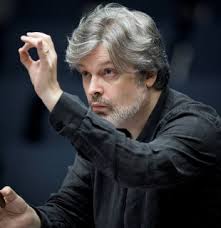Na jarenlange concerten in de ‘Rode Doos’ aan de A2, is De Vrijdag van Vredenburg van AVROTROS op Radio 4 afgelopen zomer teruggekeerd naar het centrum van Utrecht. Het nieuwe TivoliVredenburg werd geheel gebouwd rondom de voormalige Grote Zaal van Vredenburg, wereldwijd vermaard vanwege zijn fabelachtige akoestiek. Menigeen pinkte een traantje weg bij de heropening.
Bij een nieuwe zaal hoort nieuwe muziek, dacht programmeur Astrid in ’t Veld, en zij vroeg twee componisten een nieuw werk te schrijven. Beide composities beleven komende hun wereldpremière. De Schotse componist James MacMillan houdt op vrijdag 7 november zijn Percussion Concerto No. 2 ten doop, in een uitvoering door het Radio Filharmonisch Orkest en de Britse slagwerker Colin Currie onder leiding van James Gaffigan.
Op 28 november presenteren het Radio Filharmonisch Orkest, het Groot Omroepkoor en dirigent Markus Stenz Rising Phenix van Joey Roukens, waarvan de titel verwijst naar de uit zijn as herrezen Grote Zaal. MacMillan schreef zijn concert op het lijf van de percussionist Colin Currie, Roukens componeert voor het eerst voor een combinatie van symfonieorkest en groot koor.

James MacMillan (1959) streeft in zijn muziek naar een directe communicatie met het publiek en laat zich hierbij vaak inspireren door zijn katholieke geloof. Hij maakte naam met werken als The World’s Ransoming voor althobo en orkest, twee grootschalige Passies en zijn eerste slagwerkconcert, Veni, Veni Emmanuel. Hij componeerde dit in 1992 voor de Britse slagwerker Evelyn Glennie. Het monumentale, maar levendige en afwisselende concert betekende zijn internationale doorbraak en het werd al meer dan driehonderd keer uitgevoerd.
Zijn nieuwe concert schreef MacMillan voor de eveneens Britse percussionist Colin Currie. MacMillan: ‘Ik ken Colin al sinds hij nog een teenager was en we hebben het eerste slagwerkconcert ontzettend vaak samen uitgevoerd. Ik ben onder de indruk van de overtuiging en inzet waarmee hij mijn muziek speelt, en ken zijn interpretatie van haver tot gort. We zijn vrienden geworden en toen hij me vroeg om een nieuw slagwerkconcert, heb ik die kans met beide handen aangegrepen.’
De Schot wilde niet in herhaling vallen: ‘Ik zocht naar nieuwe wegen, niet alleen qua thematiek en structuur, maar ook qua instrumentatie. Colin heeft me een heleboel slagwerkinstrumenten voorgespeeld die ik nog niet kende. Bijvoorbeeld de recent ontwikkelde alufoon, een instrument dat bestaat uit een lange buis waarop aluminium doppen zijn gemonteerd in de rangschikking van pianotoetsen. Het houdt het midden tussen glockenspiel en vibrafoon en kan fel en metalig klinken, maar ook lieflijk – opwindend om voor zo’n nieuw instrument te schrijven.’
Anders dan zijn op de Advent geïnspireerde eerste slagwerkconcert, heeft Percussion Concerto No. 2 geen religieuze achtergrond: ‘Dit is een volkomen abstract stuk, met als basis de klank van metalen slagwerkinstrumenten. Naast de solist zijn er twee orkestpercussionisten en samen vormen ze soms een trio, bijvoorbeeld in het begin. Dan spelen zij alle drie marimba, maar in verschillende octaven en met ander materiaal, zo ontstaat een soort meta-marimba.’
Opmerkelijk is ook de inzet van een steel-drum, die vaak associaties oproept met Surinaamse muziek. MacMillan: ‘Dat heb ik bewust vermeden. De steel-drum heeft een ongekende rijkdom aan klankkleuren en kan heel gevoelig klinken. Het gaat mij vooral om die laatste kwaliteit, want de kern van dit stuk is lyrisch. Maar het blijft een slagwerkconcert, dus ik pak ook ritmisch flink uit en de solist moet hard werken. Hij wisselt vaak snel van instrument, zodat het publiek hem heen en weer ziet hollen over het podium. Het is niet alleen muzikaal, maar ook visueel een spektakel, dat geeft een extra dimensie.’ [Tweet “”James MacMillan: My Percussion Concerto No.2 is also a visual spectacle, that adds an extra dimension””]
Ook voor de een generatie jongere Joey Roukens (1982) is communicatie met het publiek belangrijk. Hij weigert zich te houden aan opgelegde mores en gebruikt zonder enige gêne welluidende harmonieën en opzwepende ritmes, die lange tijd ‘verboden’ waren. Hij mixt met veel flair allerlei muziekstijlen tot één geheel: van pop tot jazz en van filmmuziek tot Mahler of Charles Ives. Zijn werk heeft een aanstekelijke energie en opgewekte toon. Bekende werken zijn de kinderopera Mr. Finney, het orkestwerk Out of Control en Scenes from an Old Memory Box voor ensemble.
Het vandaag uitgevoerde Rising Phenix is Roukens’ eerste compositie voor orkest en groot koor. Een buitenkans, vindt hij: ‘Het zijn toch twee machtige monsters die je tot je beschikking hebt, waarmee je een groots emotioneel gebaar kunt maken. Bovendien is dit ook de bezetting van een aantal werken uit de muziekgeschiedenis die me heel dierbaar zijn, zoals bijvoorbeeld de Negende Symfonie van Beethoven, de Psalmensymfonie van Stravinsky en Coro van Berio. Ook James MacMillan schreef voor deze combinatie.’
Roukens spreekt met waardering over zijn oudere collega: ‘Ik hou van de directheid van zijn muzikale taal, zijn werk is nooit cerebraal en komt op mij erg intuïtief over. Zelf leg ik als componist ook niet de nadruk op systeem of constructie, ik voel me aan hem verwant. We bewegen ons allebei op het vlak van wat ik “stilistisch pluralisme” noem – niet omdat we geen keuzes kunnen maken, maar omdat we zoeken naar verbindingen tussen verschillende muziekstijlen, die zijn onderdeel van ons muzikale dna.’
Met de wederopstanding van Vredenburg in zijn achterhoofd ging Roukens op zoek naar geschikte teksten: ‘Ik vond al snel het gedicht The Building of the Temple van de Victoriaanse dichter Henry Newbolt, over de wederopbouw van de tempel van Salomon. Die heb ik doorsneden met Latijnse verzen uit Tabula smaragdina van de mythische figuur Hermes Trismegistus over alchemie en hermetiek. Ze gaan beide over transformatie.’
Rising Phenix heeft twee delen: ‘Het eerste laat zich beluisteren als één grote, geleidelijke transformatie van traag verglijdende, mysterieuze muziek naar een vitale, geëxalteerde sfeer. Het tweede begint reflecterend en berustend, wordt donkerder van toon op woorden als terror, pain en doom en werkt naar een dissonante climax toe. Het stuk eindigt met een euforisch gejubel in D- en E groot, waaraan een zekere bombast niet vreemd is. Ik vraag me zelfs af of het niet té ver gaat, maar ik zoek de kitsch-grens bewust op. Ik vond het heerlijk die muzikale bling-bling te componeren.’
7 november TivoliVredenburg Grote Zaal 20.15 uur: Radio Filharmonisch Orkest / James Gaffigan: James MacMillan: Percussion Concerto No. 2, wereldpremière
28 novemberTivoliVredenburg Grote Zaal 20.15 uur: Radio Filharmonisch Orkest + Groot Omroepkoor / Markus Stenz: Joey Roukens: Rising Phenix, wereldpremière
Speciale actie:
De lezers van dit blog krijgen korting op beide premières:
Voor de concerten op 7 en 28 november samen betaalt u samen slechts € 45,- ipv € 64,-
Voor een afzonderlijk concert betaalt u € 25,- ipv € 32,-
Stuur hiertoe een mail met uw adresgegevens naar kassa@tivolivredenburg.nl o.v.v. ‘Blog Cultuurpers‘, of bel naar de kassa 030 231 45 44

